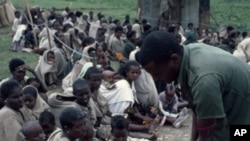The song We are the World broke a record as the fastest-selling single in history. The first shipment of 800 thousand records sold out in three days. It was a unique undertaking – a recording with the profits going to help others rather than the artists. The song was recorded on the evening of 28 January 1985 and released as a single five weeks later. Within four months, it had raised more than 50 million dollars in aid. In the 25 years since, the song, the album and related merchandise have raised nearly $65 million for African aid.
Even more astonishing than its success is the fact that it did not cost a penny to record, promote or distribute. “At that time,” says Executive Director of United Support of Artists for Africa (USA for Africa) Marcia Thomas, “everybody was on board with the idea … that this was going to happen. Nobody was taking any money and no one was getting paid, and everyone was doing this because it was for a cause that everyone had signed onto.” She laughs. “Nobody wanted to be the one that changed that.”
In May, 1985, four months after the song was recorded, USA for Africa received its first royalty check of six point six million dollars. Ken Kragen, who originally organized We are the World, was also the first president of USA for Africa. At a press conference at which he accepted the check, he announced that a dozen representatives of USA for Africa would be escorting an airlift of supplies Africa the next month. He said no funds would be distributed directly; rather, the charity would use the trip as a fact-finding mission to learn where the needs were greatest.
USA for Africa board members chartered a jet packed with 260 thousand tons of food, vitamins, medicine, tents, blankets—and even refrigeration equipment. Kragen was on board the plane, along with several doctors and a handful of celebrities—among them, Harry Belafonte and Michael Jackson’s brother Marlin. Kragen remembers their arrival in Sudan as an intensely emotional experience. “It was very interesting because the big issue was drought, and as we landed it was raining, which in itself was considered quite an omen.” He recalls that everyone on board the plane began to cry with emotion and exhaustion from the long trip.
On the ground in Sudan, they got their first lesson in the challenges of giving aid. The Sudanese government threw a welcoming luncheon reception. At one point, says Kragen, a military general approached them with a request. “He said, ‘If you would just put two million dollars in the bank here, we will see that it gets taken care of in the right way.’ Now, we were a fairly young and naïve group of people, but we weren’t that naïve.”
The next hurdle facing the aid group was getting relief supplies to the camps. The roads were impassable in some places, and their trucks broke down frequently. “We got to Addis Ababa,” says Kragen, and found that the cranes, many of them were broken down. There were a whole series of relief boats out on the ocean with supplies, but they couldn’t unload them. So we spent money making sure that could be taken care of.”
At first, USA for Africa distributed funds to US-based organizations carrying out famine relief in East Africa, such as Care and Save the Children. After 1987, says Thomas, USA for Africa began funding grants and development programs directly. “We gave … to more than four hundred different projects (on the ground) during a five- or six-year period,” says Thomas. “We funded everything from education, water, water well development, capacity building, training, agricultural improvements, women’s projects, entrepreneurial projects… We were probably one of the first groups to give what is called micro-finance funding."
Over the years, We are the World has continued to generate money – so far $64 million – and that figure may soon get a big boost: To mark the 25th anniversary of the original song, USA for Africa tells VOA it is planning a new recording of it in January of 2010. “Plans are afoot,” says Kragen, “to bring together the top artists, not only in America…but in this case, worldwide … in a major re-recording of the song, a very dramatic one, and that project is pretty much being announced as we’re talking.”
Organizers have not yet said who will participate. But Kragen tells VOA that African artists are now being actively recruited—and will include some “big names.”
Will the new We are the World be as successful a fundraiser as the first? Kragen says the plans are to make it an “audacious” event—but the rest will be up to the consumer and the listening public.
News
We are the World Remembered: Getting Aid to Those in Need
update

USA for Africa has generated $64 million in African aid over the past 25 years



